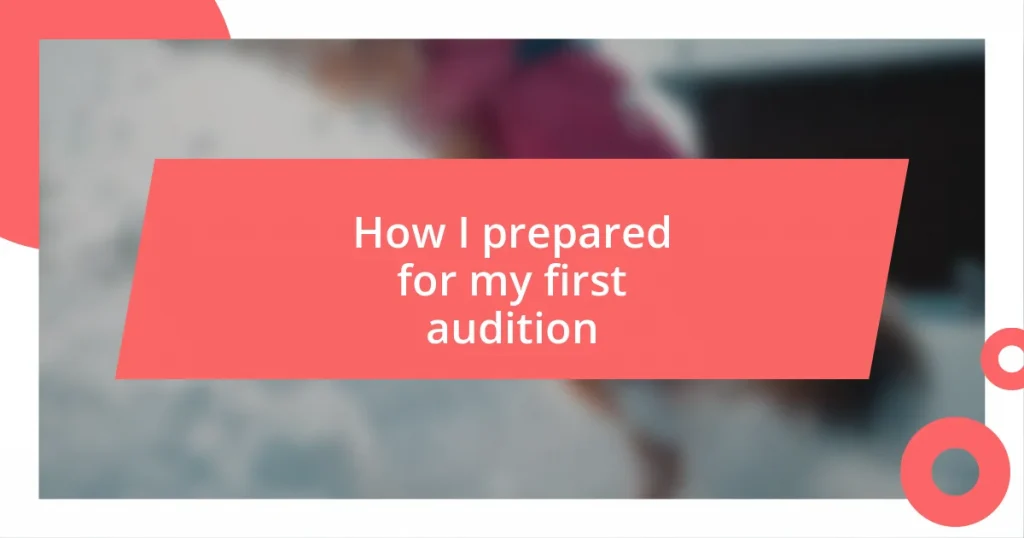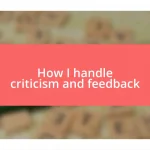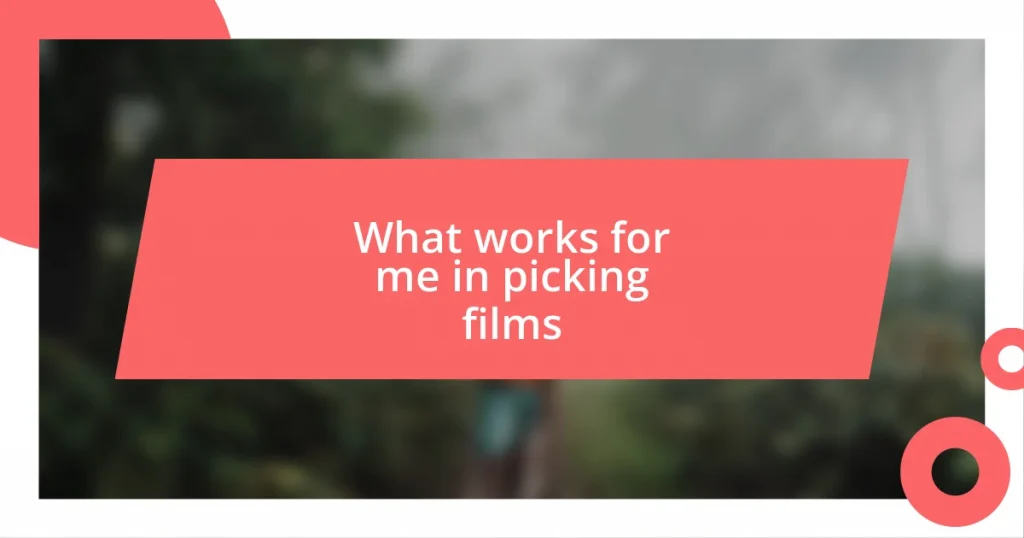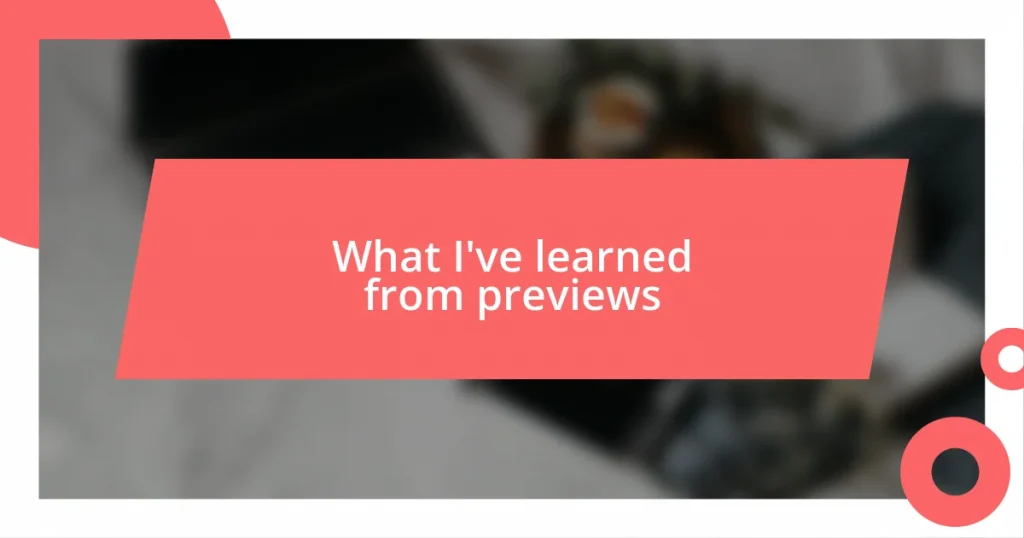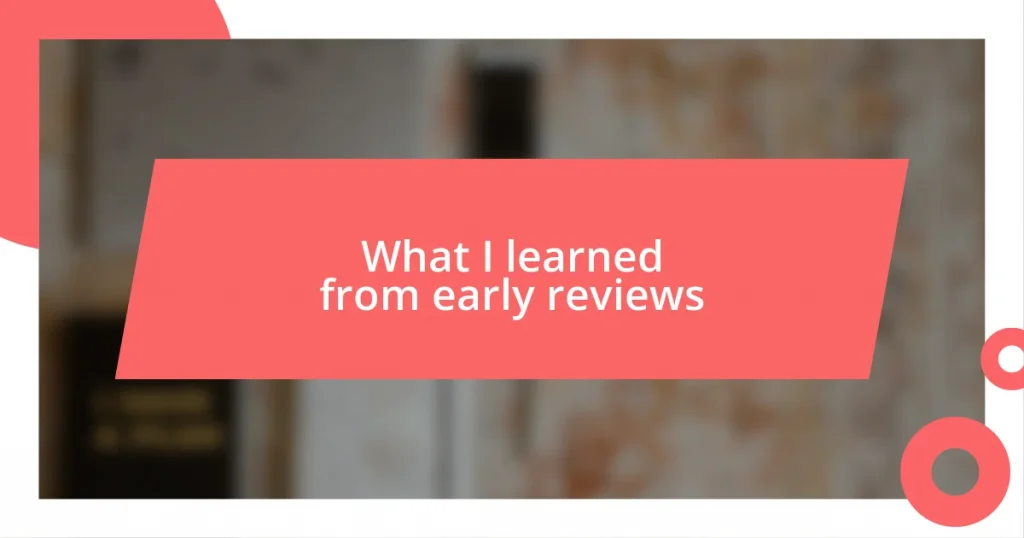Key takeaways:
- Shift your mindset to view auditions as opportunities for personal growth rather than just performance pressure.
- Set specific, achievable audition goals to enhance confidence and focus on learning from each experience.
- Practice techniques and manage nerves through preparation, breathing exercises, and positive affirmations to improve overall performance.
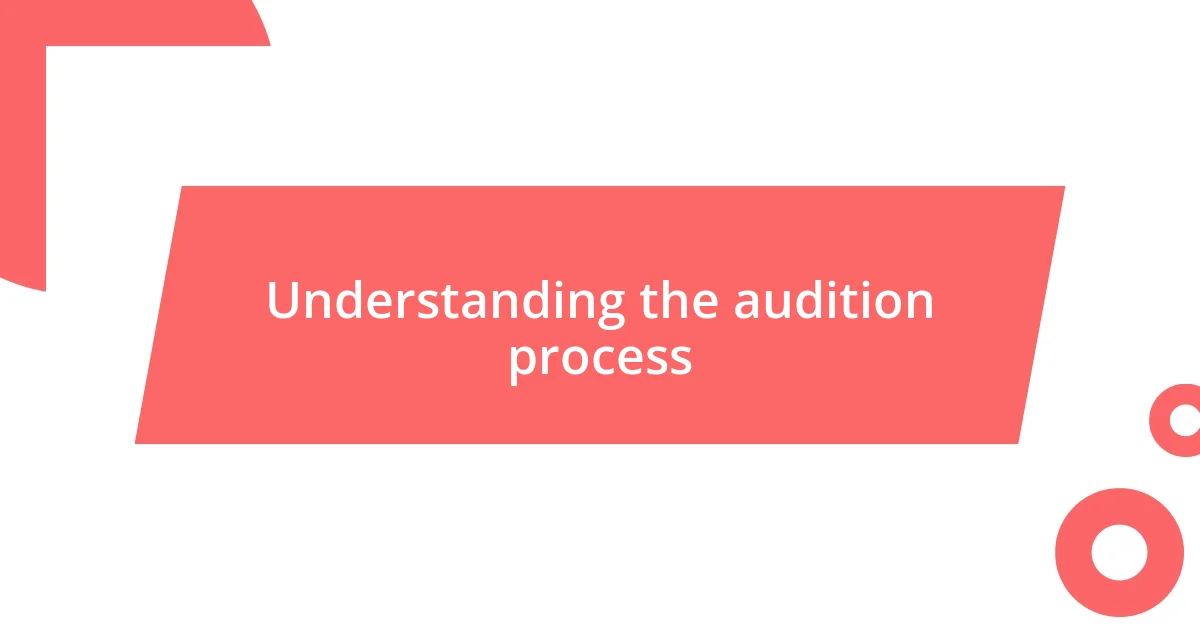
Understanding the audition process
Understanding the audition process can feel overwhelming, but it’s essential to shift your mindset. I remember my first audition vividly; I was nervous and unsure but soon realized that everyone in the room was rooting for me. Isn’t it reassuring to think that casting directors want you to succeed just as much as you want to shine?
Navigating the audition terrain often involves more than just performing; it’s about showcasing your personality. When I walked into my audition, I focused on connecting with the material rather than worrying about perfection. This led me to wonder: how often do we forget that authenticity can be our strongest asset?
Timing is also a crucial element in auditions. One late arrival can throw off your whole vibe, which happened to me once. I learned the hard way that arriving early allows you to settle in and absorb the atmosphere. How would you feel walking into an audition room fully prepared and relaxed, instead of rushed and flustered? That anticipation is part of the journey, and it’s something I’ve come to value deeply.
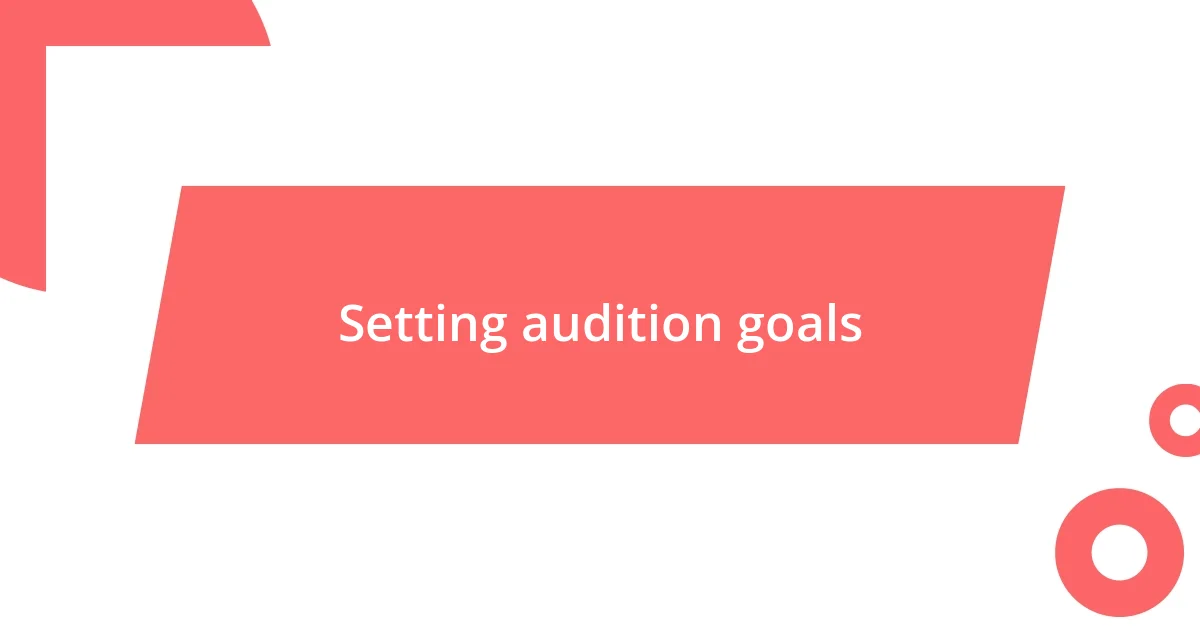
Setting audition goals
Setting audition goals is like laying the foundation for a building; without it, everything can feel shaky and uncertain. I remember sitting down and contemplating what I truly wanted from my first audition. Instead of just thinking about landing the role, I focused on smaller, achievable objectives, like improving my confidence or connecting genuinely with the casting team. These smaller goals are what helped ground me in the process.
Here are some goals I found beneficial to set:
- Focus on learning: Every audition is an opportunity to grow as a performer, regardless of the outcome.
- Practice specific skills: Identify an area you want to improve, whether it’s your monologue delivery or emotional range.
- Build confidence: Aim to feel more self-assured with each audition, shaping a positive mindset.
- Network with industry professionals: Use the audition as a chance to connect and leave a lasting impression.
- Reflect on your performance: After each audition, take time to analyze what went well and what you can improve for next time.
By setting these purposeful objectives, I felt more empowered and less intimidated. The experience became less about pressure and more about personal growth and connection.
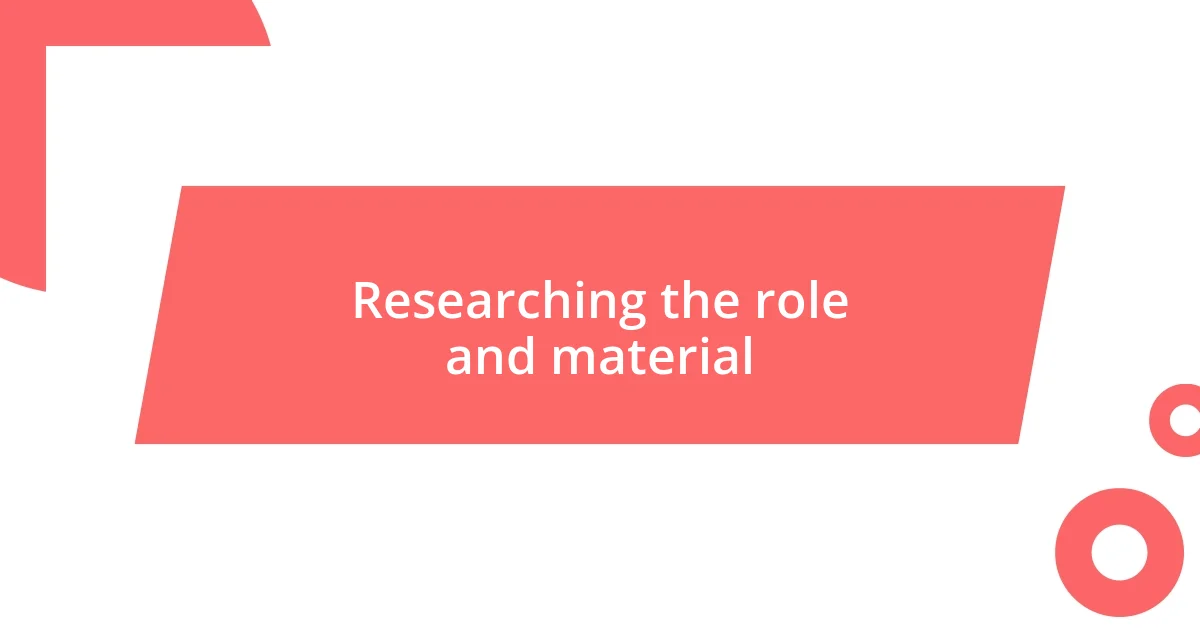
Researching the role and material
Researching the role and material is a fundamental step for any audition, and I learned that firsthand. I remember diving deep into character backgrounds and scripts, like trying to fit together pieces of a puzzle. Each detail clarified how to embody the character fully. Isn’t it fascinating how a simple line in the script can hold layers of meaning? I recall discovering nuances in my character that shaped my nervous energy into a more authentic portrayal.
To prepare, I also watched different interpretations of similar roles – not to mimic, but to understand the range of possibilities. For example, I stumbled upon a performance that completely shifted my perspective and gave me fresh ideas for my own audition. Engaging with material in diverse ways helped me find my unique voice. I often found myself asking, how can I make this character my own? This exploration became a fun, creative process that alleviated my anxiety and excitement for the audition.
Ultimately, the research turned out to be more than just preparing for the role; it was about connecting and resonating with the character’s journey. The insights gained during this preparation gave me confidence as I entered the audition room. It was my way of telling the universe that I was ready for this challenge. I truly believe that your understanding and insights about the material can set you apart – it’s all about bringing your genuine self to the forefront.
| Research Approach | Personal Insight |
|---|---|
| Diving into the script for character depth | Revealed layers of the character, enhancing authenticity. |
| Watching different interpretations | Inspired creative ideas for a unique performance. |
| Connecting emotionally with the material | Boosted confidence and reduced anxiety for the audition. |
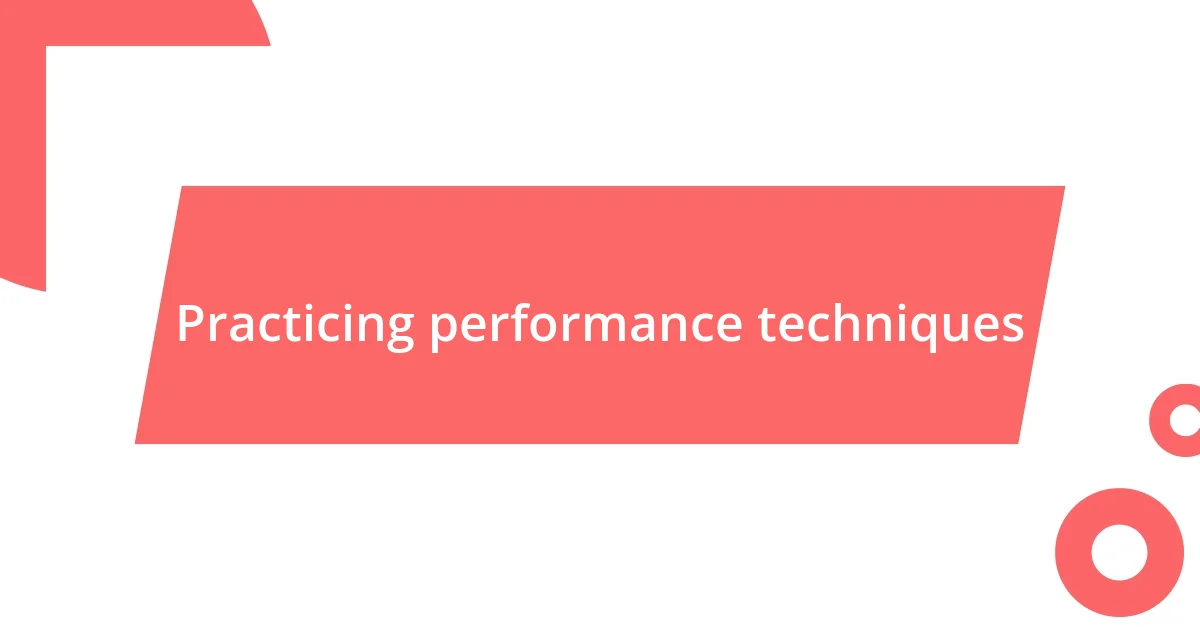
Practicing performance techniques
Practicing performance techniques is really where the magic happens. I vividly remember spending hours in front of the mirror, running through my lines while incorporating gestures and facial expressions. At times, I felt silly talking to my reflection, but it helped me recognize the importance of physicality in creating a character. Have you ever noticed how a slight change in posture can entirely alter a scene? That’s what I was after – finding those subtle nuances that made my portrayal feel genuine.
In addition to practicing in front of the mirror, I began recording my rehearsal sessions. Watching those videos was both eye-opening and a bit cringe-worthy. I could see everything: the moments when I rushed through lines, the awkward pauses, and even the hesitation in my voice. I took notes on what needed improvement and worked on those areas specifically. How can one improve what they can’t see? This realization motivated me to pay attention to every detail, ultimately transforming my approach to performance.
As the audition approached, I incorporated varied exercises to feel more dynamic. I tried breathing techniques to calm my nerves and warm-up routines to get my body ready. One night, I explored improvisation with a friend, which opened up new dimensions of spontaneity and creativity. I remember feeling exhilarated with every unpredictable moment we created. Isn’t it exhilarating to step outside your comfort zone? Practicing these techniques not only built my skills but ultimately fostered a deeper connection to my performances.
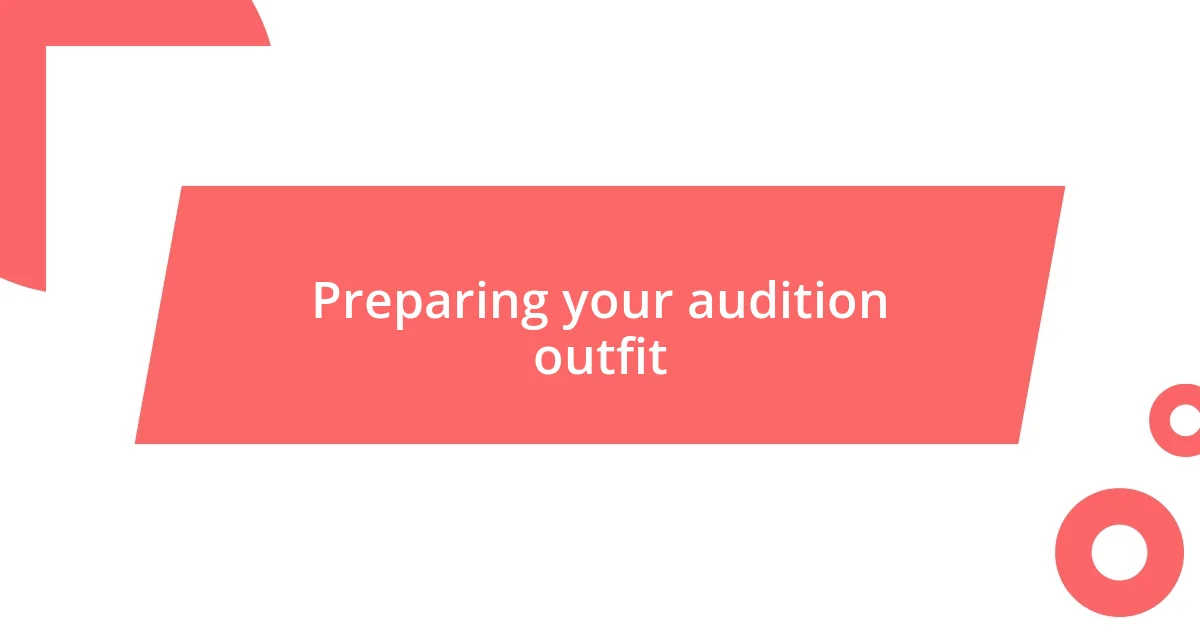
Preparing your audition outfit
When it came to selecting my audition outfit, I found that comfort played a huge role in my confidence. I remember pulling out a few options from my closet, trying to balance style with ease of movement. One particular outfit—a fitted top that highlighted my figure paired with tailored pants—helped me feel both professional and in control, allowing me to focus on my performance rather than what I was wearing. Have you ever noticed how certain clothes can change your mindset? That was the magic I aimed for.
I also learned the importance of colors in expressing my character. Choosing a vibrant hue not only lifted my spirits but also conveyed energy to the casting directors. I still vividly recall the moment I slid into my chosen outfit and looked in the mirror. The colors made me feel daring and ready to take on the challenge ahead. In that moment, I thought to myself, “This is my time to shine!” Dressing in a way that resonates with the character can really reinforce how you embody them.
Finally, I made sure to consider every detail, from accessories to footwear. The right shoes are crucial—something I underestimated at first. I opted for comfortable heels that gave me that extra bit of height without causing discomfort. I remember a friend once telling me that every small choice contributes to the overall package in an audition. It’s true; a small accessory can tie the whole outfit together and speak volumes about your character’s personality. What I realized is that when you feel good in your outfit, your performance quality elevates, and you can truly connect with the audition experience.
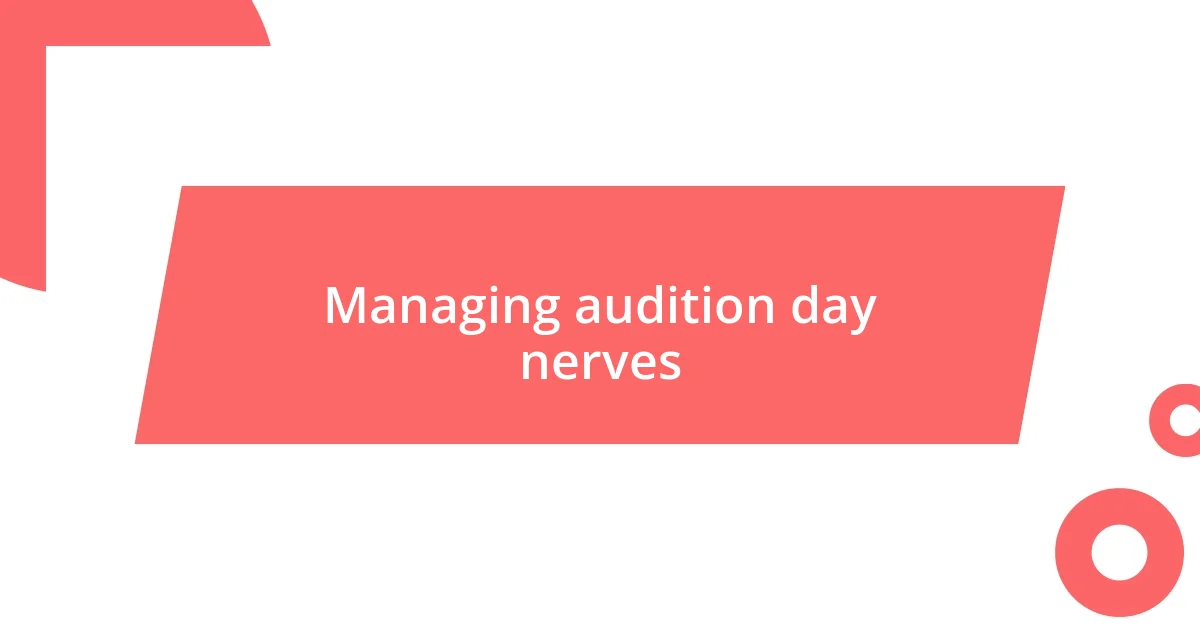
Managing audition day nerves
When audition day arrived, I felt a rush of nerves that I couldn’t quite shake off. It was almost like standing at the edge of a diving board, knowing I had to leap but feeling that knot in my stomach. To combat this, I focused on my breathing; I’d create a routine where I took deep, measured breaths, feeling the air fill my lungs. Have you ever thought about how something as simple as breathing can ground you? For me, this little practice was a game changer.
As I waited in the audition room, I noticed that the other actors seemed just as anxious as I was. It’s funny how shared anxiety can create a sense of camaraderie, almost like an unspoken acknowledgment that we were all in this together. To channel that energy, I engaged in light conversation with others, sharing a laugh which eased the tension. I found that laughter could diffuse a lot of nervous energy—who knew that a friendly exchange could remind us all why we were there in the first place?
Finally, I had a mantra I repeated to myself quietly: “I am enough.” This simple phrase helped me regain focus and confidence amidst the fluttering nerves. I remember whispering it under my breath just before stepping onto the stage, and I could almost feel the weight of my apprehensions lift. Isn’t it amazing how a few words can shift your entire mindset? By fostering that sense of self-acceptance, I allowed my true self to shine in the moment, rather than letting nerves steal the show.
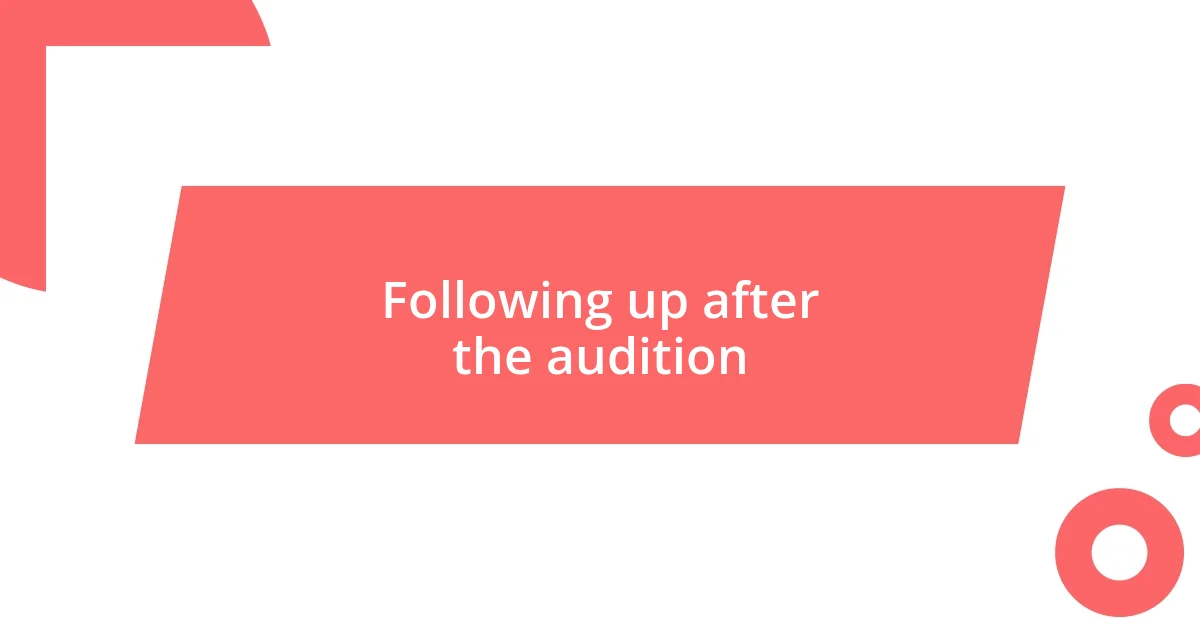
Following up after the audition
After the audition, I found myself in a whirlwind of emotions. I felt both relieved and anxious, wondering how I had performed. It’s a strange feeling, isn’t it? I mean, pouring your heart into a few moments and then waiting for feedback can be an exercise in patience. What I learned is the importance of giving myself space to process that experience—rather than obsessing over every little detail, allowing myself to reflect helped me move forward.
Reaching out for feedback afterward was another crucial step. I remember sending a thank-you email to the casting director, expressing my gratitude for the opportunity. While it felt a bit nerve-wracking at first, I appreciated how it kept the lines of communication open. Have you ever noticed how a simple thank you can leave a lasting impression? In my experience, building those relationships can be just as important as the audition itself.
Interestingly, I discovered that following up can also include checking in with fellow auditioners. I had a chance to share insights with someone I met in the waiting area, which turned out to be a great way to ease my own worries. Discussing our experiences not only offered comfort but also reminded me that everyone else was navigating similar feelings. Have you ever found camaraderie through shared experiences? Just knowing we were in this together helped me not feel so alone in the aftermath of that audition.










